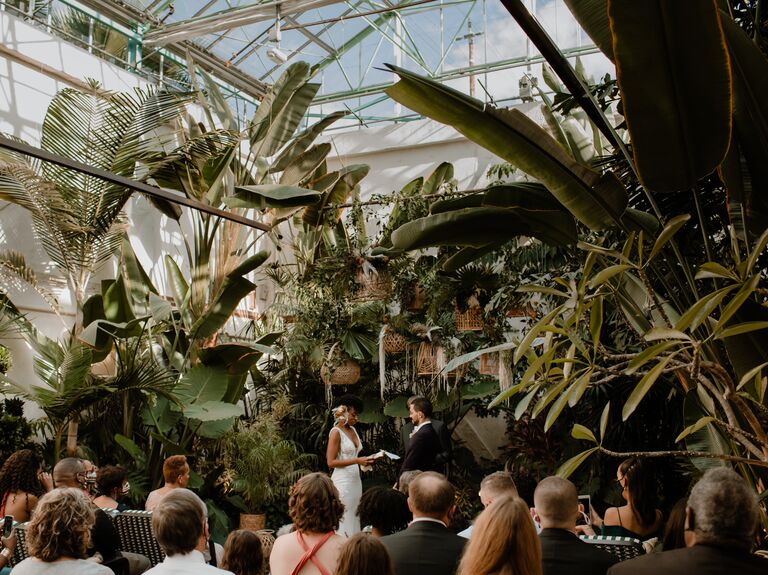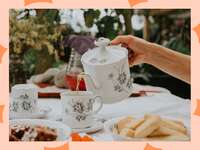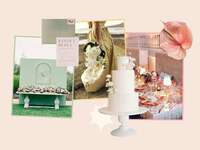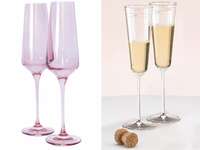How to Incorporate Sustainable Wedding Flowers Into Your Eco-Friendly Wedding
Are you planning a sustainable wedding? If so, that doesn't mean you have to miss out on things such as wedding flowers because you're afraid you won't find a florist who will keep the environment at the forefront. Ensuring you're using sustainable wedding flowers on your big day may seem overwhelming, which is why we're here to help. We've chatted with several florists who specialize in sustainable and eco-friendly flowers about everything you need to know about incorporating them into your festivities and reducing floral waste.
In this story:
- What Is a Sustainable Florist?
- What Are Eco-Friendly Alternatives to Floral Foam?
- How to Make Your Wedding Flowers Sustainable
- How To Not Waste Flowers at a Wedding
What Is a Sustainable Florist?
A sustainable florist is one who "prioritizes reducing waste that is sent to a landfill, minimizes use and exposure to toxic chemicals, and chooses flowers sourced closer to home (80% of flowers purchased in the US currently come from overseas)," explains wedding expert Molly Culver of Molly Oliver Flowers. Sustainable florists work to create beautiful and eco-friendly flower arrangements for their clients while preventing any unnecessary floral waste.
To find a florist near you, including florists that source sustainable flowers, The Knot Marketplace is a great place to start. Simply enter the city and state you're interested in to find recommended florists. It is best practice to read the vendor's "About" section to ensure they use sustainable florals. Once you're done some preliminary research, make sure to ask the wedding florist some questions to get a sense of their commitment to the planet and sustainability.
What Are Eco-Friendly Alternatives to Floral Foam?
There are several eco-friendly alternatives that can be used instead of floral foam. Culver explains that "we call these types of structures "armatures," or "mechanics," in the industry. Eco-friendly alternatives are ones that florists can safely handle, and reuse again and again, and ideally are made from organic materials and so would biodegrade." We've listed a couple of the most popular below.
Oshun Pouches
Oshun Pouches are a relatively new and sustainable product that have become available to florists. Carrie Waggoner, experiential manager at Flowers for Dreams explains that "they are made from a blend of 100% organic coco coir, which is contained inside a pouch made of plant starch, such as corn or beets which makes them a great eco-friendly alternative to traditional floral foam."
Chicken Wire
Chicken wire isn't just for bird coops, you can use it in floral design as well. Kristen Pulcheon, Director at Fiori Florals Design Studio says that oftentimes chicken wire is a better option when it comes to creating arrangements as opposed to floral foam.
Moss
Moss is an eco-friendly material you can consider. Although Moss can be used with any kind of arrangements, Pulcheon says they have the most impact on garden-style arrangements.
Flower Frogs
Flower frogs are devices used to organize and keep flowers in place. Pulcheon says that "frogs are perfect for dish arrangements and creating that modern, dainty look." Waggoner adds that "frogs provide a sturdy base for arrangements while also being better for the environment."
How to Make Your Wedding Flowers Sustainable
There are several ways you can ensure that your wedding flowers are eco-friendly. Waggoner, Culver and Pulcheon provided us with some expert tips on ways you can ensure that you will have eco-friendly flower arrangements and sustainable wedding bouquets on your big day.
Select In-Season Florals
Whether you're having a vibrant summer wedding, a rustic fall wedding, a boho spring wedding or an icy winter wedding, selecting flowers that are in-season is vital to having sustainable wedding flowers. Pulcheon notes that when you use in-season flowers from local farms, that you're reducing carbon emissions as sourcing out-of-state flowers typically requires lots of energy to package, ship and transport via plane or boat. Waggoner adds that in-season flowers are typically better adapted to the environment which means that there is less of a need for pesticides and chemicals as these flowers are increasingly resilient to pests and diseases.
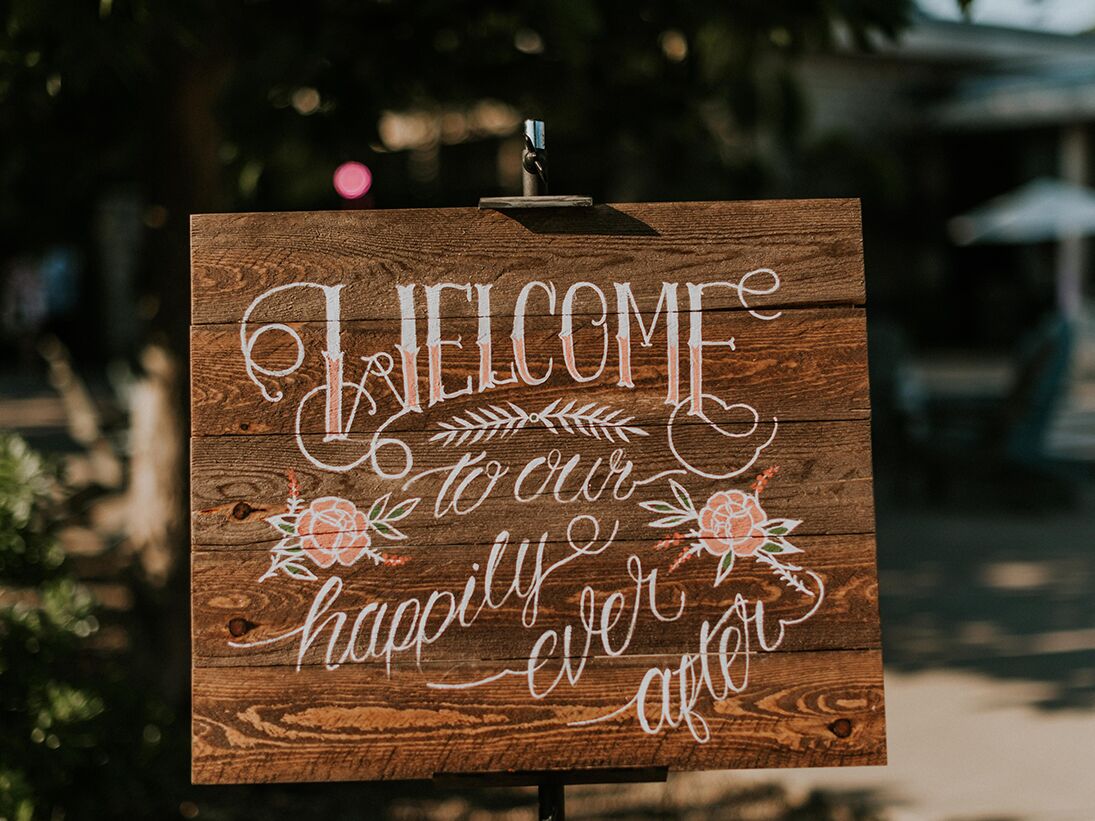

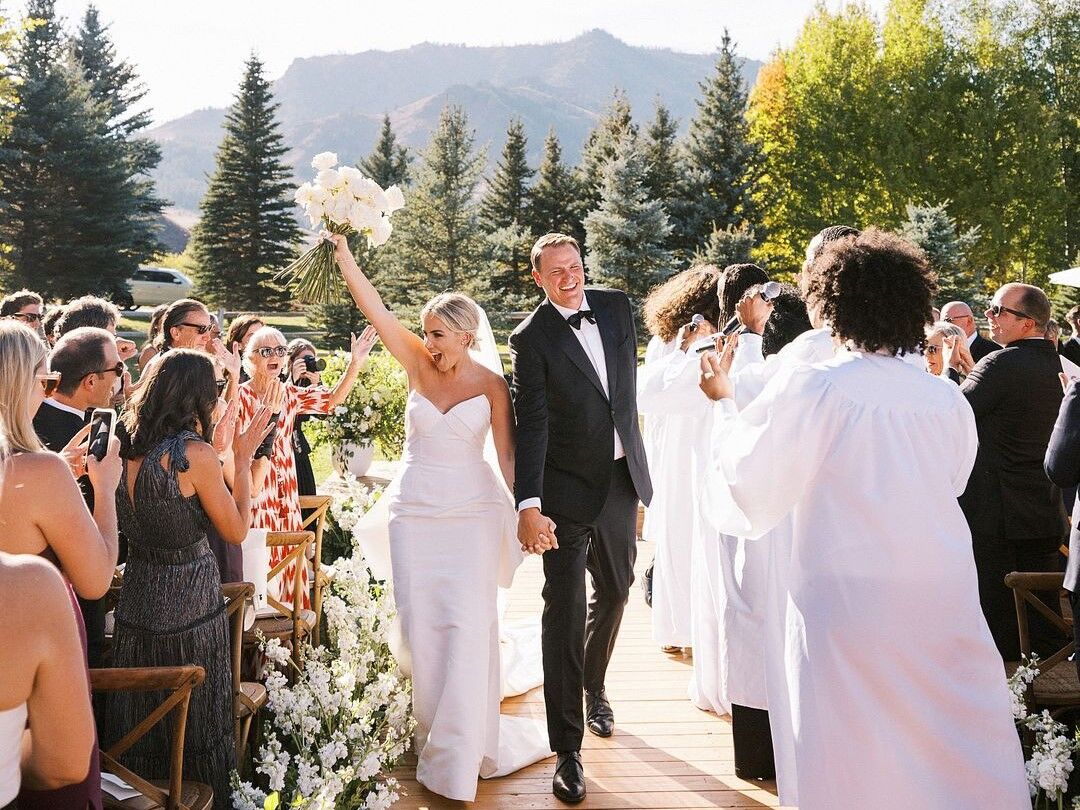
Buy Locally
There are many benefits that come with buying your wedding flowers locally. Waggoner explains that "the farther the flowers are grown from the client, the more time they spend in transit. Air freighting and trucking flowers from long distances is energy intensive. Flowers must be refrigerated to maintain freshness and the cold-chain requires more energy the further the flowers are to the end consumer." Buying locally also means selecting blooms native to the region. With regard to sustainable wedding bouquets, "any hand tied bouquet using local fresh flowers is going to be the most sustainable option," says Pulcheon.
Ensure Your Florist is Sourcing Local Flowers
When consulting with florists to make your sustainable wedding flower visions a reality, there are a couple of questions and key points to keep in mind. Pulcheon notes that "florists are typically upfront about where and who they source their flowers from. If you see on their website or social media that they partner with local farms, that's a green flag!" You can also do some extra research after your conversation as well if you feel so inclined.
Waggoner recommends considering "working with a Certified B-Corp business, which is required to demonstrate a high commitment to social and environmental impact. She adds that "you can also look for flowers certified by third-party partners like Veriflora, BloomCheck, FairTrade and Rainforest Alliance."
It is usually easy to tell if a florist is offering flowers that are not locally sourced if they are not in season or native to the area. If that is the case, it may be a red flag and you may want to inquire further or take your business elsewhere.
Use Dried Flowers
If you want to use dried flowers, they can be a great and eco-friendly tool "so long as they aren't dyed using synthetic chemicals (Milk Paint is one alternative product on the market right now; 100% compostable)," explains Culver.
How To Not Waste Flowers at a Wedding
There are several ways you can preserve flowers and eliminate waste at your wedding. Continue reading for a couple of ideas.
Flower Girl/Person Alternatives
We know that seeing a flower girl or person make their way down the aisle at the start of a ceremony may warm everyone's heart—but what if we told you that they could have the same effect without creating so much waste.
Instead of using flower petals, Culver says popcorn, rice and other biodegradable / synthetic chemical-free pieces are favorable options. If you're looking to stay away from any materials that go on the floor, Waggoner says having the flower girl hold bubbles or a lantern can create a personal touch without the waste.
Dry and Preserve Flowers
If you want to keep your flowers lasting even after your special day, drying and pressing them is a great way to do so. Waggoner shares that "you can hang flowers upside down in a dark, dry place to dry them out, or press them to enjoy longer."
Compost
If you have a garden at home and want to keep it nourished, you can compost your wedding flowers to keep your garden well-fed and thriving. You can also inquire about how your florist manages the floral waste inside of their studio. Culver shares that she and her team compost everything that goes unused before and after an event.
Reuse
Flowers are easily able to be reused which is one of the reasons why they are so great. For example, after the ceremony, you could reuse the bridesmaid bouquets and have them serve as table centerpieces or hand the bouquet's flowers out to guests as favors at the end of the reception.
Donate
If you do not wish to keep your wedding flowers, consider donating them. Where you choose to donate them is up to you. However, Waggoner recommends donating them to nursing homes and hospitals if you're wanting to spread some extra joy.
